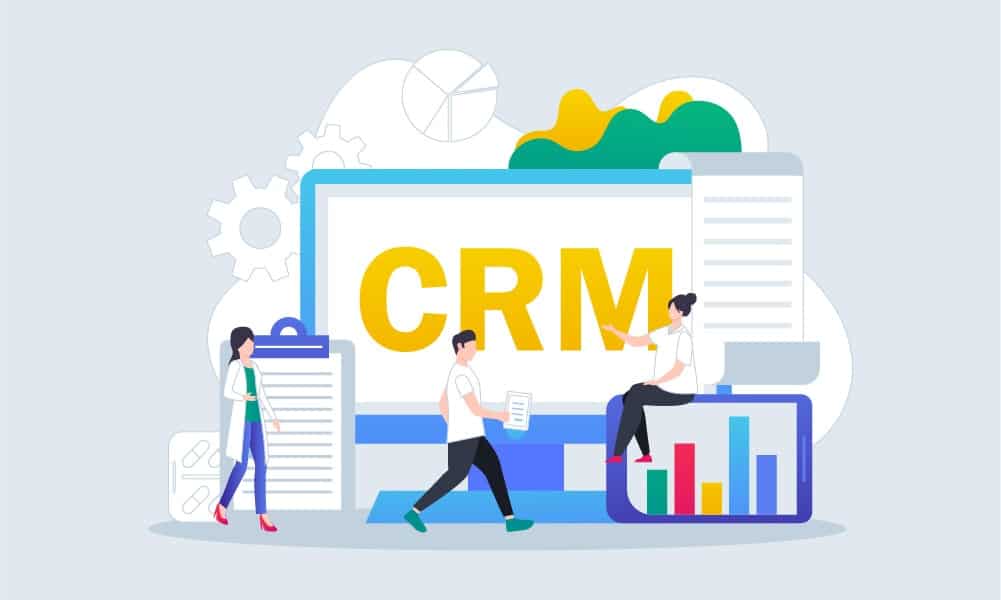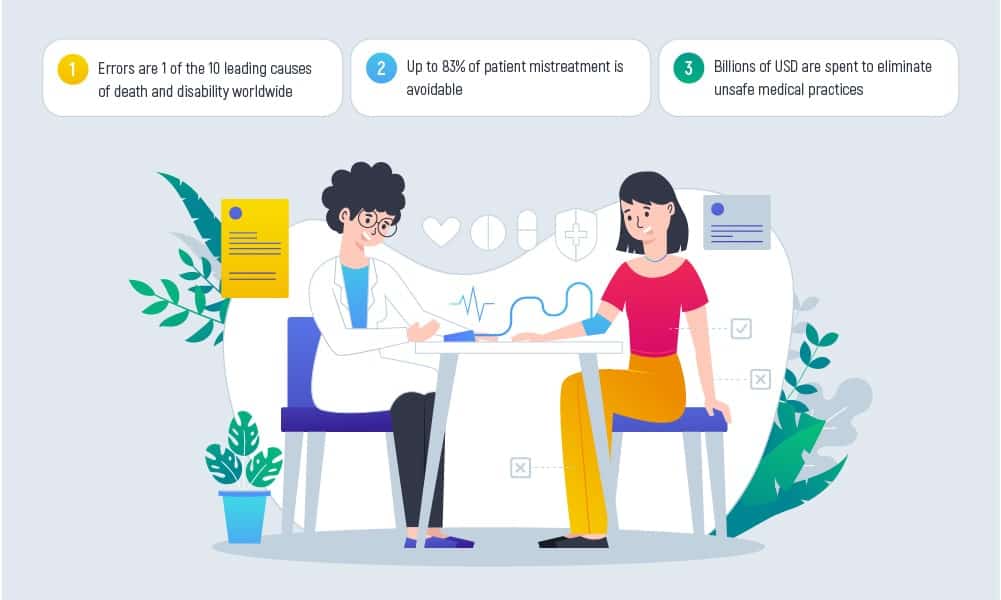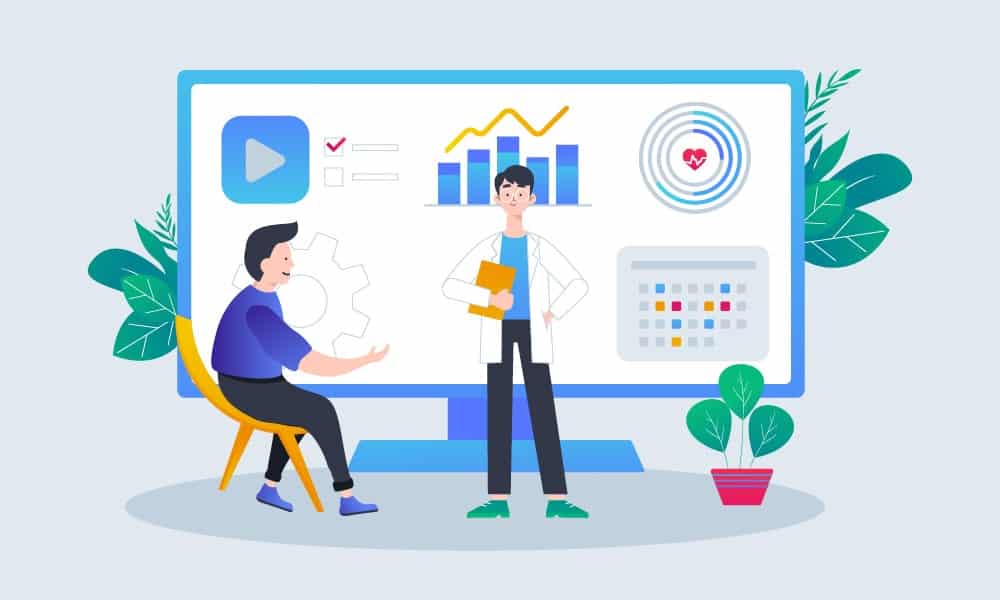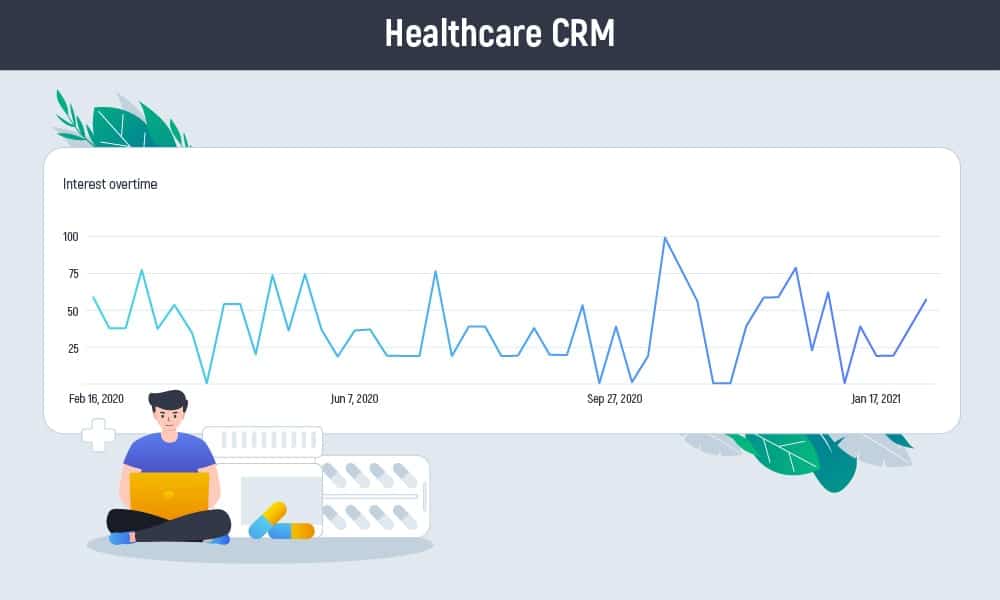In the dynamic landscape of healthcare, the integration of Customer Relationship Management (CRM) systems is revolutionizing patient care, operational efficiency, and communication. This article delves into the pivotal role of CRM in the healthcare sector, exploring its impact, benefits, and key features.
Here are key takeaways:
- Customer Relationship Management (CRM) in the healthcare sector is valued at $14.2 million in 2022 and is projected to grow at a CAGR of 10.60% from 2023 to 2032.
- Healthcare CRM aims to improve organization, communication, and patient management through software solutions.
- The use of CRM systems in healthcare offers numerous benefits, including enhanced healthcare delivery, improved treatment practices, reduced errors, and comprehensive patient data insights.
- Key features of healthcare CRM software include task management, communication tools, telehealth integration, analytics and reporting, and patient data management.
Want to discover more? Let's proceed further!
- What is CRM in Healthcare?
- Is There a Need for Customer Relationship Management in the Healthcare Industry?
- Benefits of CRM in the Healthcare Industry
- 1. Reinforcement of healthcare delivery
- 2. Enhancement of treatment practices
- 3. Reduction of errors in diagnosis and medical treatment
- 4. Improvement of patient attentiveness by
- 5. Facilitating smooth healthcare communication
- 6. Comprehensive patient data insights
- 7. Ensured Patient Data Security
- 8. Hospital mechanism management simplification
- 9. Streamlined communication
- 10. Targeted marketing and outreach
- What Are the Healthcare CRM Features?
- Task management
- Communication tools
- Telehealth integration
- Analytics and reporting
- Patient data management
- What are Common Types of Healthcare CRM Software?
- Analytical
- Collaborative
- Operational
- Best Healthcare CRMs on the Market
- Why Does Your Business Need Healthcare CRM?
- Consider Inoxoft Your Trusted Partner
- Final Words
10 uses of virtual reality in medicine
What is CRM in Healthcare?
CRM is an abbreviation that stands for Customer Relationship Management, a software system developed to enhance and promote a positive customer management experience. The mission of a single CRM in hospital industry is to help in:
- being organized
- keeping track of every work-related operation
- inputting, carrying out, and following up on notes, tasks, reminders, collaborations, projections, and analytics
- getting a personalized design
CRM meaning in healthcare is to keep you updated, show you what works in your management approaches and what requires changes, allow you to work in a team and as a team player, connect to different add-on tools, obtain and store customer data/feedback, and gain brilliant management insights.
There are numerous types of CRMs: for sales, marketing, services, social interactions, support, analytics, collaboration, startups, communities, volunteering, art, and remote work management. Which of these types is the right CRM software for the healthcare industry?
Is There a Need for Customer Relationship Management in the Healthcare Industry?
In 2022, CRM in healthcare sector was valued 14,2 million and is forecasted to increase a compound annual growth rate (CAGR) of 10.60% during the forecast period (2023 – 2032). The projected revenue by 2025 will be equal to $21,462.6 million.
The healthcare sector includes all the business that provides medical services, develops medical equipment, offers medical insurance, and offers healthcare services to patients. With the on-growing demand, a dynamic CRM for healthcare can manage and support every healthcare setting with outstanding technological advancements.
The years of paperwork and hand-written patient records, bills, and administrative blanks have finally received a good substitution. Any services the healthcare industry provides for people require specific approaches and constant monitoring of errors.
Most of these errors happen due to human factors: miscommunication between healthcare providers or physicians and patients, inability to manage correctly patient records, or remember patient-related notes. 2020-2030 is claimed to be the period WHO calls “A Decade of Patient Safety”, which should prevent healthcare disorganization and the cause of it – errors leading to negative outcomes.
Check the impact of AI on healthcare
It is impossible to resolve all the faults and flaws of medical systems worldwide but one of the solutions for healthcare communication and management enhancement is the healthcare CRM software.
The best CRMs for healthcare should:
- be secure and support the privacy policy standards of your region, like HIPAA and HITECH standards in the USA
- integrate with the healthcare institution’s Electronic Health Record that stores all the medical patient data
- use a decision-making assistant tool such as the Clinical Decision Support System
- automate event scheduling, patient intake, medication and other reminders, and nurse management
- warehouse patient records to prevent record losses and patient harm
Benefits of CRM in the Healthcare Industry
As a CRM system is one of the best ways to manage and control everything and everyone within the working environment, it may offer the following benefits
1. Reinforcement of healthcare delivery
CRM systems contribute to strengthening the delivery of healthcare services by improving accounting management processes and operational planning. The relevance of CRM for hospital services shows in the automation of payment processes tied to patient records, pre-organization of financial reporting and analysis of expenses, informed decision-making and strategic resource allocation.
2. Enhancement of treatment practices
The systems improve patient treatment quality practices, including more accessible and controlled patient management within healthcare settings and speed up hospital customer relationship management. One of the most significant benefits of CRM in healthcare is the elimination of endless dispatches and bureaucratic processes.
3. Reduction of errors in diagnosis and medical treatment
CRM systems enable healthcare professionals to access accurate and up-to-date information, leading to more accurate diagnoses and personalized treatment approaches. They can integrate emergency care, therapy, and diagnosis management that would result in more effective outcomes and patient satisfaction.
4. Improvement of patient attentiveness by
The implementation of CRM in the healthcare industry leads to optimizing patient distribution and management. They allow the creation of innovative therapies and interventions tailored to emerging diagnoses, encompassing quality management aspects.
5. Facilitating smooth healthcare communication
CRM systems play a vital role in monitoring internal employee communication within healthcare organizations, enhance external communication in the healthcare sector, and excel in providing the latest medical information both within the organization and external stakeholders.
6. Comprehensive patient data insights
An extended medical history enables healthcare professionals to gain deeper insights into a patient’s health journey and make more informed treatment decisions. Additionally, the CRM system minimizes waiting times and generates valuable predictions related to patient stay, retention rates, and real-time statistics.
7. Ensured Patient Data Security
CRM systems include essential measures such as encrypting patient-sensitive data to safeguard confidential patient information from unauthorized access, focusing on HIPAA requirements. Furthermore, the integration of CRM systems in healthcare emphasizes the advancement of secure authentication and network connection protocols.
8. Hospital mechanism management simplification
These systems optimize healthcare customer relationship management for hospital workers, reduce the need for extensive manual documentation guidance for medical employees and offer healthcare mobile CRM systems, enabling hospital staff to access patient information and increasing patient engagement in the treatment process.
9. Streamlined communication
To further enhance the benefits of CRM systems in the healthcare industry, a crucial step involves seeking feedback from medical workers and patients about their experiences with the CRM-based approach. It involves implementing changes that address the concerns raised, enhance the positive aspects, and provide solutions that cater to both medical workers’ and patients’ needs.
10. Targeted marketing and outreach
A healthcare CRM is a robust resource for various marketing specialists, furnishing insights into diverse patient behaviors. This data becomes a valuable resource for experts to enact potent strategies. For instance, they can undertake the initiatives, like tailored marketing campaigns, personalized marketing, or evaluation of physician popularity and treatments.
What Are the Healthcare CRM Features?
Healthcare CRM provides a multitude of functionalities to its users: healthcare organizations and their patients derive advantages in increased patient contentment and the more effective delivery of care.
Task management
CRM systems can ensure that responsibilities are appropriately distributed, leading to a more balanced and coordinated approach. Team members can easily view their assigned tasks, deadlines, and priorities, which facilitates effective time management and reduces the risk of tasks falling through the cracks.
Communication tools
Email integration, SMS notifications, and secure messaging facilitate seamless and timely interactions between healthcare providers and patients while enhancing patient engagement and supporting efficient healthcare team communication.
Telehealth integration
CRM systems empower healthcare providers to embrace the realm of virtual appointments, facilitating secure and reliable video consultations that bridge the gap between patients and caregivers, regardless of physical locations.
Analytics and reporting
Robust analytics tools constitute a cornerstone of Healthcare CRM systems being a vital mechanism for illuminating patient trends, preferences, and engagement dynamics. Through the meticulous analysis of collected data, healthcare organizations can glean invaluable insights that extend beyond the realm of immediate patient interactions.
Patient data management
Designed to focus on precise patient management, healthcare CRM software permits the creation, ongoing updates, and meticulous categorization of patient records based on medical conditions, patient feedback, or any other specific criteria.
What are Common Types of Healthcare CRM Software?
Healthcare CRM software comes in various types tailored to specific aspects of patient management, engagement, and healthcare operations. Here are some common types of healthcare CRM software:
Analytical
These systems are equipped with robust analytics tools that allow healthcare organizations to delve deep into patient data, behavior patterns, and trends. That will enable you to access valuable insights that aid in informed decision-making, process optimization, and strategy refinement.
Collaborative
Collaborative software facilitates seamless interaction and information sharing among healthcare professionals, enabling efficient collaboration across various departments and specialities. These CRM systems enhance patient care coordination, decision-making, and organizational efficiency by emphasizing teamwork and communication.
Operational
Operational software focuses on streamlining and optimizing day-to-day operations, often including features like appointment scheduling, patient records management, and task coordination among healthcare professionals. These CRM systems can contribute to better patient care delivery and more effective internal processes.
Best Healthcare CRMs on the Market
There certainly are standout Healthcare CRM solutions, each designed to enhance patient experiences, optimize operational efficiency, and contribute to improved healthcare outcomes. From robust patient data management to seamless communication tools, these CRMs empower healthcare providers to navigate the complexities of modern healthcare while prioritizing personalized and efficient care delivery.
Let’s delve into the distinctive features and benefits offered by each of these leading Healthcare CRM solutions.
-
Salesforce Health Cloud is a comprehensive CRM solution designed specifically for healthcare organizations. It provides a 360-degree view of patients, enabling better care coordination, personalized engagement, and improved patient outcomes. With features such as integrated communication tools and analytics, Salesforce Health Cloud empowers healthcare providers to deliver efficient and patient-centric services.
-
HubSpot Health CRM — a user-friendly solution tailored for the healthcare industry. It offers tools for managing patient relationships, automating marketing processes, and enhancing communication. HubSpot’s platform enables healthcare organizations to streamline their workflows, engage with patients through various channels, and ultimately improve patient satisfaction.
-
SugarCRM is known for its flexibility and adaptability, making it a versatile choice for healthcare organizations. With customizable features for patient management, SugarCRM allows healthcare providers to create tailored solutions that meet their unique needs. Its capabilities include patient data management, communication tools, and analytics for informed decision-making.
-
Microsoft Dynamics 365 for Healthcare, part of the broader Dynamics 365 suite, offers a range of tools for patient engagement and care coordination. It integrates seamlessly with other Microsoft applications, providing a unified platform for healthcare professionals. With features like patient record management and analytics, it assists organizations in delivering more personalized and efficient care.
-
Zoho CRM for Healthcare combines the user-friendly interface of Zoho CRM with features tailored to the healthcare sector. It facilitates patient management, appointment scheduling, and communication. Zoho CRM’s affordability and scalability make it an appealing choice for smaller healthcare practices looking to enhance their patient relationships.
As the global demand for healthcare treatment is heightened these couple of years due to the COVID-19 pandemic, the CRM software for doctors remains crucial in emergency cases and fast medical aid responses.
Discover more with our article about Big Data and Education
Why Does Your Business Need Healthcare CRM?
Within the realm of healthcare, a CRM platform proves invaluable — it empowers you to compile a targeted list of consumer groups that are most likely to resonate with and respond positively to your marketing endeavors. The focus here is about attracting the right patients that are most likely to find value in your services and become long-term patrons.
CRM in the healthcare sector equips service providers with the tools needed to deliver top-notch medical care at an optimal cost. If you’re at the helm of a healthcare institution and contemplating the integration of customer relationship management systems into your day-to-day operations, CRM emerges as an indispensable solution that furnishes you with the capability to efficiently input, analyze, and disseminate data, ensuring that your healthcare institution operates with precision and effectiveness.
Consider Inoxoft Your Trusted Partner
Inoxoft is a healthcare software development company that knows the value of CRM in the healthcare sector and can deliver top-notch web and mobile applications based on your requirements and user needs. Customer relationship management in healthcare is an essential tool that should be automated and advanced to receive the best experience in patient management. So far, our expert team of software engineers has delivered some outstanding healthcare solutions for different client purposes. You can look through them here. We value patient health greatly and are always happy to build an app for the good cause!
Hire an offshore development team and benefit from the healthcare industry CRM solution Inoxoft can offer to enhance your business. Contact us to start working on your healthcare CRM project right away or receive a consultation on how to hire a software developer for an existing team to enhance your existing product development. In any case, Inoxoft may become your trusted partner with innovative solutions and a smart tech-savvy team.
Final Words
CRM system is a groundbreaking and life-changing solution to enhance the positive patient experience in dealing with healthcare services. We offer our own custom healthcare solutions by our domain experts. We have an opportunity to deliver medical software that assists healthcare professionals, automates daily work-related processes, and has a personalization option to make your experiences even more user-friendly. Have a look at our successful healthcare solution stories and, let’s chat.
Frequently Asked Questions
What is CRM in healthcare?
CRM is an abbreviation that stands for Customer Relationship Management, a software system, that is developed to enhance and promote a positive customer management experience. The mission of a single CRM system is to help in
- being organized
- keeping track of every work-related operation
- inputting, carrying out, and following up notes, tasks, reminders, collaborations, projections, and analytics
- getting a personalized design
What are the benefits of healthcare customer relationship management?
- Reinforcement of healthcare delivery
- Enhancement of quality treatment practices and their effectiveness
- Reduction of errors in diagnosis and medical treatment
- Improvement of patient attentiveness
- Promotion of seamless communication within the healthcare institution
- Full access to patient medical CRM reports, metrics, and dashboards
- Support of legal compliance and security of patient data
- An easy approach to learning how CRM for hospitals works
- An advanced way to receive the most accurate employee and patient feedback
- Shift towards better medical treatment due to CRM for healthcare providers
What should a CRM software for healthcare industry include?
The best CRMs for healthcare should
- be secure and support privacy policy standards of your region, like HIPAA and HITECH standards in the USA
- integrate with the healthcare institution’s Electronic Health Record that stores all the medical patient data
- use a decision-making assistant tool such as the Clinical Decision Support System
- automate event scheduling, patient intake, medication and other reminders, and nurse management
- warehouse patient records to prevent record losses and patient harm












